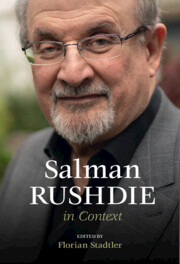Book contents
- Salman Rushdie in Context
- Salman Rushdie in Context
- Copyright page
- Dedication
- Contents
- Contributors
- Acknowledgements
- Introduction
- Part I Life
- Chapter 1 Salman Rushdie, Biography, and Autobiography
- Chapter 2 Salman Rushdie and the Fatwa
- Chapter 3 Archival Rushdie
- Chapter 4 Salman Rushdie as Public Intellectual
- Part II Literary and Creative Contexts
- Part III Historical and Cultural Contexts
- Part IV Critical Theoretical Contexts
- Part V Reception, Criticism, and Adaptation
- Works by Salman Rushdie
- Select Bibliography
- Index
Chapter 1 - Salman Rushdie, Biography, and Autobiography
from Part I - Life
Published online by Cambridge University Press: 23 March 2023
- Salman Rushdie in Context
- Salman Rushdie in Context
- Copyright page
- Dedication
- Contents
- Contributors
- Acknowledgements
- Introduction
- Part I Life
- Chapter 1 Salman Rushdie, Biography, and Autobiography
- Chapter 2 Salman Rushdie and the Fatwa
- Chapter 3 Archival Rushdie
- Chapter 4 Salman Rushdie as Public Intellectual
- Part II Literary and Creative Contexts
- Part III Historical and Cultural Contexts
- Part IV Critical Theoretical Contexts
- Part V Reception, Criticism, and Adaptation
- Works by Salman Rushdie
- Select Bibliography
- Index
Summary
Rushdie’s autobiographical writing has detailed his early career, his life in hiding during the fatwa after 1989, and his re-emergence into public life since 1998. Joseph Anton requires particular attention not only because of its narrative voice in the third person but also because of its appropriation of both biographical and fictional devices in an attempt to tell ‘as much truth as possible’ about his private self, Salman, who is masked under the public image of Rushdie. Reading Joseph Anton alongside other notable biographical works on Rushdie, namely J. Weatherby’s Salman Rushdie: Sentenced to Death, Steven Grandison’s The Satanic Verses 30 Years On, and BBC Imagine’s semi-biographical documentary Fatwa: Salman’s Story, this chapter sheds light on the complex interplay of fiction, fact, ‘truth’, and the literary constructions of self, society, and the world in Rushdie’s work.
- Type
- Chapter
- Information
- Salman Rushdie in Context , pp. 13 - 25Publisher: Cambridge University PressPrint publication year: 2023



